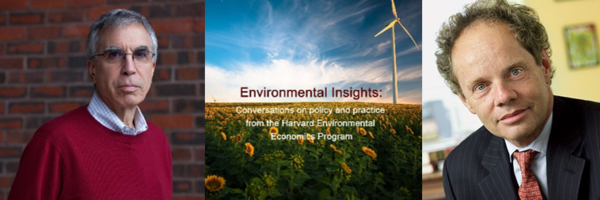
CAMBRIDGE MA. – Richard Revesz, the Lawrence King Professor of Law at New York University and co-founder of the Institute for Policy Integrity, shared his thoughts on how the transition to a new presidential administration later this month will impact US environmental and climate change policy in the latest episode of “Environmental Insights: Discussions on Policy and Practice from the Harvard Environmental Economics Program,” a podcast produced by the Harvard Environmental Economics Program. Listen to the interview here. A transcript of the interview is available here.
Hosted by Robert N. Stavins, A.J. Meyer Professor of Energy and Economic Development at Harvard Kennedy School and director of the Harvard Environmental Economics Program and the Harvard Project on Climate Agreements, Environmental Insights is intended to promote public discourse on important issues at the intersection of economics and environmental policy.

Reflecting on the past four years of the Trump Administration, Revesz pointed to the decisions to roll back vehicle CAFE standards, to repeal the Obama Administration’s Clean Power Plan, and to pursue what it termed “strengthening” regulation as examples of bad policy with negative consequences.
“On virtually any significant environmental issue, the Trump Administration was on the wrong side. It was on the wrong side of the legal issues; it was in the wrong side of the economic issues; it was in the wrong side of the scientific issues. And it was really on the wrong side of history,” he remarked. Revesz also implied that the administration’s disrespect for science and economics might have a very deep and injurious impact on environmental policy going forward.
However, Revesz also expressed optimism that the incoming administration may be able to undo some of the damage done over the past four years.
“I am extremely hopeful and very optimistic that the Biden Administration will restore confidence in science and economics, and that these will be taken as serious analytical frameworks, and not as tools to be bent at will to justify the political preferences of the moment,” he said. “And that is extremely important because I don't think our country could take another four years of the bending of truth without it having very serious long-term repercussions.”
Revesz also said he expects the Biden-Harris Administration to hold true on its campaign promises to push forward with tough greenhouse gas emission policies.
“I expect we'll see a continued significant ratcheting down of automobile emissions, including much greater penetration of zero emitting vehicles,” he remarked. “And we will see very significant work, I assume and hope, on the stationary source side. Even in the Obama Administration, where we ended up with regulations for new oil and gas facilities, we didn't have regulations for existing facilities, which is where a lot of the emissions are. The electric sector will have to be looked at. And then other industrial sectors that have not yet been being gotten attention, like refinery cement plants, will need to get significant attention. So, I see a lot happening on the regulatory side.”
Despite the obstacles the Biden-Harris Administration may face from legal challenges to new regulatory actions due to the 220 judges appointed by President Trump as well as the new 6-3 conservative majority in the Supreme Court, Professor Revesz maintains that the new administration will be much more successful in defending its regulatory actions in the courts than was the Trump administration, which lost an astonishingly high 83 percent of challenges against its regulatory actions.
Revesz’s interview is the 19th episode in the Environmental Insights series, with future episodes scheduled to drop each month.
“Environmental Insights is intended to inform and educate listeners about important issues relating to an economic perspective on developments in environmental policy, including the design and implementation of market-based approaches to environmental protection,” said Stavins. “We speak with accomplished Harvard colleagues, other academics, and practitioners who are working on solving some of the most challenging public problems we face.”
Environmental Insights is hosted on SoundCloud, and is also available on iTunes, Pocket Casts, Spotify, and Stitcher.
| revesz_podcast_transcript_1.5.2021_post.pdf | 151 KB |
